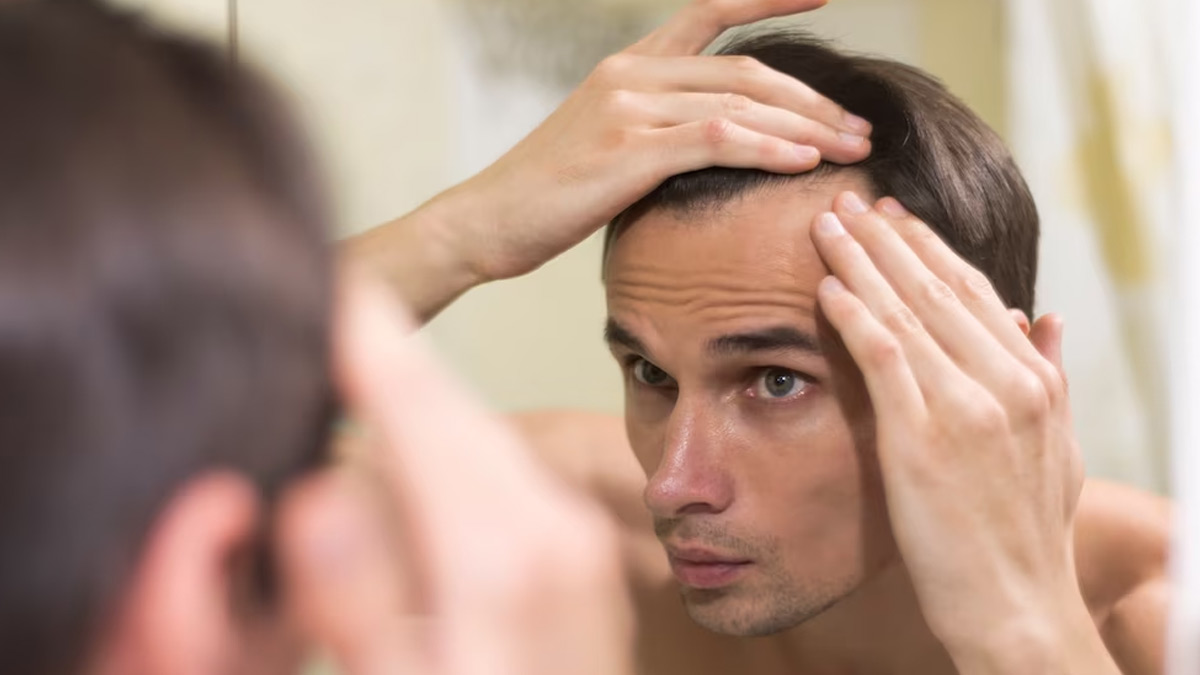
Have you ever noticed your hairline moving backwards? Or have you experienced hair thinning on the temples of your forehead? This indicates the onset of male pattern baldness.A receding hairline can be a source of concern and self-consciousness for many individuals. The process of hair loss can vary from person to person, but a rapidly receding hairline is a common cause for alarm.
Table of Content:-
Dr SK Gupta, Dermatologist, DMCH, Darbhanga explains prominent reasons behind a swiftly receding hairline and explores potential solutions to address this issue.
Male Pattern Baldness (Androgenetic Alopecia)
One of the most prominent reasons for a receding hairline in men is male pattern baldness, also known as androgenetic alopecia. This hereditary condition is linked to genetics and hormonal changes. Over time, hair follicles become sensitive to the hormone dihydrotestosterone (DHT), leading to gradual hair thinning and a receding hairline.
Also read: Do You Pluck Your Grey Hair? Expert Explains If It Turns The Rest Grey?
Female Pattern Baldness
While less common than in men, women can also experience a receding hairline due to female pattern baldness. It is often characterised by diffuse thinning at the crown and widening of the part. Hormonal changes, ageing, and genetics play a role in this condition.

Stress
Stress can have a profound impact on hair health. Chronic stress may lead to a condition called telogen effluvium, where hair follicles prematurely enter the resting phase of the hair growth cycle. This can result in excessive hair shedding and a receding hairline.
Poor Nutrition
Inadequate nutrition, particularly deficiencies in essential vitamins and minerals like biotin, zinc, and iron, can contribute to hair loss and a receding hairline. A balanced diet that supports hair health is essential.
Hairstyles and Hair Treatments
Use of harsh hair treatments, like frequent chemical straightening or colouring, can weaken hair and cause it to recede.
Medications
Some medications, including certain antidepressants, blood thinners, and chemotherapy drugs, may have hair loss as a side effect. If you suspect your medication is contributing to your receding hairline, consult your healthcare provider for alternative options.
Underlying Medical Conditions
Various medical conditions, such as thyroid disorders, autoimmune diseases, and polycystic ovarian syndrome (PCOS), can manifest as hair loss, including a receding hairline. Addressing the underlying condition is crucial in such cases.
Also read: Side Effects Of Biotin: Multivitamin Overdose Is A Leading Cause Of Hair Fall
Age
Hair naturally thins as we age. The ageing process can cause changes in hormone levels, leading to a receding hairline and overall hair loss.

A quickly receding hairline can have a negative impact on one's self-esteem and confidence. The first step towards discovering effective solutions is to understand the underlying issues. If you're worried about your hairline, see a dermatologist or hair specialist who can determine the reason for your hair loss and offer appropriate remedies. While not all causes of hair loss can be reversed, there are therapies available, such as medications, lifestyle modifications, and hair restoration surgeries, that can help reduce or even reverse the trend of hair loss, giving you the opportunity to restore a fuller, more confident head of hair.
Also watch this video
How we keep this article up to date:
We work with experts and keep a close eye on the latest in health and wellness. Whenever there is a new research or helpful information, we update our articles with accurate and useful advice.
Current Version